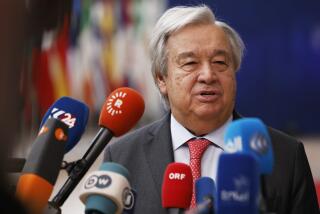Will Stress Rights in Arms Talks, West Tells East Bloc
- Share via
VIENNA — The 35-nation conference on European security and cooperation resumed here Friday, with Western powers warning the Soviet Bloc that priority should be given to making progress on human rights agreements.
Leaders of Western delegations to the conference said reductions in conventional arms sought by the Soviet Union and its Warsaw Pact allies will have to wait until they liberalize “the human dimension” in their countries.
Helmut Schaefer, a senior official of the West German Foreign Ministry, who spoke on behalf of the 12 member states of the European Communities, warned that after 15 months the talks are stagnating.
“The expectations by our people have not yet been fulfilled,” he said. He urged the conference to adopt “unequivocal commitments” to human rights agreements.
The twice-extended conference has been in session, on and off, since November, 1986. Its expressed goal is to expand and implement the Helsinki accords of 1975, which called for increased European stability in the military, political and economic fields.
Renewed Energy
The conference has gained renewed energy following last month’s summit conference in Washington, where the United States and the Soviet Union signed a treaty to eliminate ground-launched intermediate-range nuclear weapons.
Meeting separately in Vienna, members of the 23 countries that make up the North Atlantic Treaty Organization and the Warsaw Pact have been exploring ways to reduce conventional arms in Europe.
The Soviet Union has proposed a so-called asymmetrical formula that calls for the Warsaw Pact countries to reduce arms levels to an extent greater than that proposed for the West.
The East Bloc has also suggested that the conference issue a “mandate” for new conventional arms talks that would replace the near-moribund talks on Mutual and Balanced Force Reductions that have been going on here for nearly 15 years.
However, the NATO governments wish to link the mandate for conventional arms talks to positive steps by the East Bloc countries: freeing political prisoners and permitting more freedom of movement, for example.
“It is this humanitarian component in particular which gives the (conference) its great moral strength,” West Germany’s Schaefer said Friday.
Many Western delegates see the Vienna talks as an important means of increasing individual rights in East European countries, and they are determined to get a final document that will spell out some of these rights.
The chief Canadian delegate, William Bauer, said Friday that Soviet foot-dragging on human rights issues is “profoundly discouraging,” particularly in the context of “the more positive atmosphere in East-West relations . . . at the highest levels.”
He said the talks appear to be at a critical point but that if Moscow is serious about reforms in human rights, an overall agreement can be reached by summer.
“We’re not going to leave without a result,” Bauer said. “In the end, we will find an agreement because (the Warsaw Pact countries) are not prepared to sacrifice this conference. If they did, they would have no credibility in anything they say.”
The senior Soviet delegate, Viktor T. Shikalov, said the East Bloc may be willing to make compromises in human rights.
“The question of human rights and humanitarian cooperation, which for long has been an irritant between East and West, can be removed from the area of confrontational politics and placed in the sphere of practical cooperation of states,” he told the conference.
The senior U.S. delegate, Ambassador Warren Zimmerman, said privately that the Western Allies had agreed not to accept a conventional arms-control mandate until some of the human rights issues in the Soviet Bloc are resolved.
More to Read
Sign up for Essential California
The most important California stories and recommendations in your inbox every morning.
You may occasionally receive promotional content from the Los Angeles Times.










